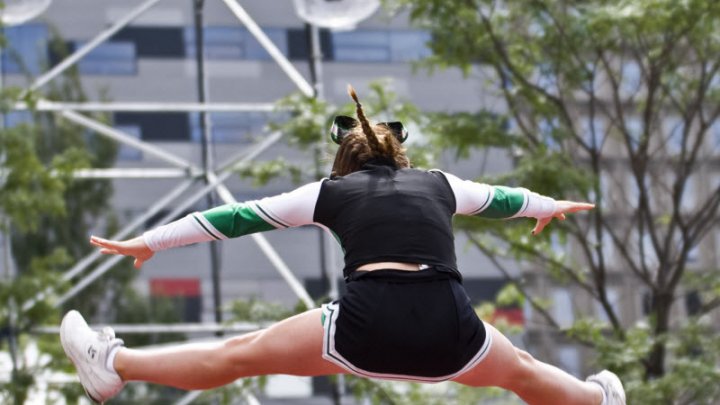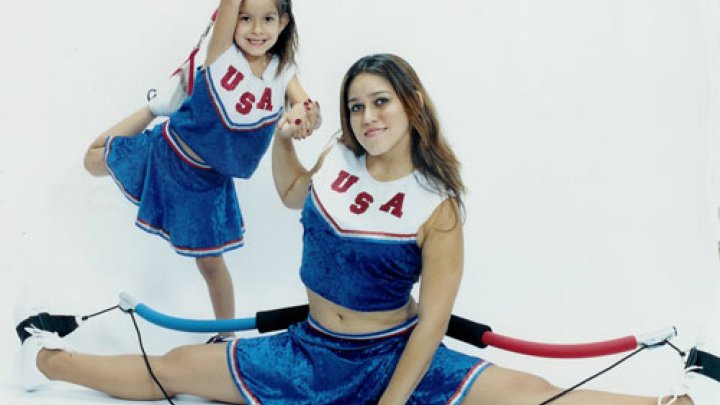When you are spending so much time around a small group of people, all or most of whom are probably girls, it is inevitable that different relationships will develop between one another. On your cheer squad, you probably have some of your closest friends. After all, you've gone through some of the most exciting and trying moments of your life together. You probably also have a few people who you would never hang out with if you weren't on the same team, but cheerleading brings you together. Finally and inevitably, there will likely be at least one girl on your squad who you simply don't get along with. Unlike a normal group, however, in which you could choose to avoid someone who rubs you the wrong way, as cheerleaders on the same team, you have to work with one another. So how do you do your best to coexist peacefully with your "frenemies"? And how do you maintain close friendships with the other girls on your team?
Girls on cheer teams often refer to one another as a "family" rather than a squad. This analogy is actually quite fitting because families may fight or they may get along, but ultimately they're stuck together. You should think of the other members of your squad in the same way. You were put together on the same team because your coach thought you would make a good group athletically. Because of that decision, you are going to be together whether you like it or not.
Several of the girls will quickly become your best friends. You will be spending so much time together after school and on weekends that you may start to see your cheer-sisters more often than your actual brothers and sisters. Naturally, people in the same group flock together. You will probably want to eat lunch together, sit next to other team members in your classes, and go to sleepovers and parties at each other's houses. Cheering together builds a bond that extends well beyond the team. You may be making lifelong friends and not even realize it at the time.
Unfortunately, not all relationships are going to be as positive. In a perfect world, the entire team would get along with one another and enjoy hanging out as a group. What often ends up happening, however, is that the team breaks up into smaller factions who become close friends. Some of these groups might not be fond of the others, which can lead to rifts among the team. When it comes down to it, you really don't have to be friends with everyone. Still, you must maintain a certain level of respect for one another if you want to be able to work as a team.
Cheer squads are usually full of drama, but the most important thing about your relationships between the squad is that you leave all conflicts at the gym door. The reason why the other cheerleaders you might not be friends with should be considered your frenemies rather than your true enemies is that as long as you are on the same squad, you have to be willing to work together. You may be a base who can't stand the flyer you are supporting, but you can't use that as an excuse for not doing your best to help her complete a stunt. You need to remember that when practice begins or when you head to a game or competition, all the petty drama ceases to be important. You must unite as a team or you will never be able to succeed as a team.
Of course, there are going to be situations when it is harder to be professional about your relationships than others. If you and another girl are both vying for squad captain, you are going to feel some animosity toward one another even if you've always been the best of friends. The same holds true when your coach assigns different positions. Not everyone can be a flyer, after all. In this type of scenario, it is important for you to really separate your role as a cheerleader from your daily life outside of the gym. Remember that competition is part of the reason you wanted to join the squad to begin with, and try not to let squabbles amongst the team jeopardize your friendships.
You might expect your coach to step in and mediate when the drama between team members gets too intense, but that really shouldn't be his or her job. Part of accepting the responsibility of being on a team is realizing that things aren't always going to be about you. If you want your team to succeed, you need to be able to put your personal feelings aside and focus on the needs of the group. Handle any conflicts responsibly, which means talking them out with the person you are having trouble with rather than talking behind her back.
Ultimately, it is going to be up to you how you manage your relationships with your teammates. You will be closer to some people than others, but that is going to be the case in most of your endeavors throughout your life. Try, therefore, to always make the best of the situation and treat your teammates how you want them to treat you. Your frenemies might stay frenemies until you both graduate, but you never know when something might change, and you could become friends.


















